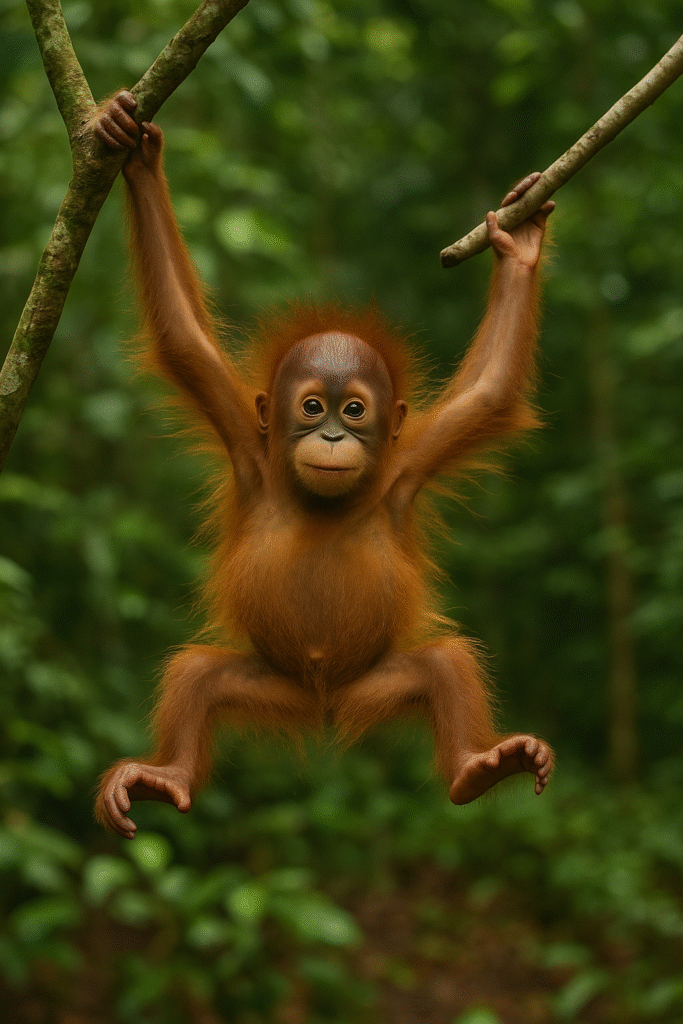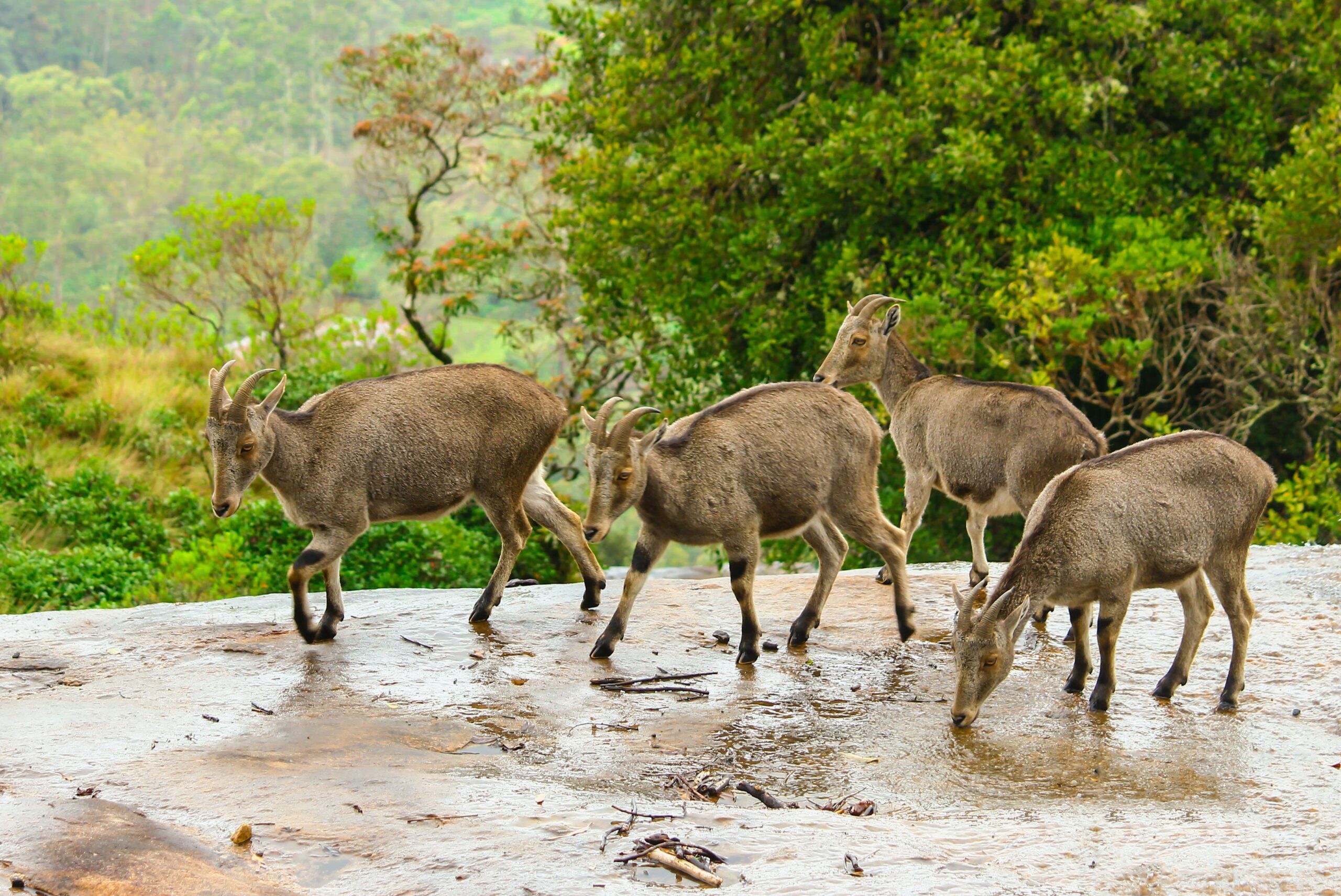Swinging gracefully through the treetops of Borneo and Sumatra, orangutans are more than just our distant cousins — they are the soul of the rainforest.

Scientific Classification of Orangutans
| Taxonomic Rank | Classification |
|---|---|
| Kingdom | Animalia |
| Phylum | Chordata |
| Class | Mammalia |
| Order | Primates |
| Family | Hominidae |
| Genus | Pongo |
| Species | Pongo pygmaeus, P. abelii, P. tapanuliensis |
There are three species of orangutans:
- Bornean orangutan (Pongo pygmaeus)
- Sumatran orangutan (Pongo abelii)
- Tapanuli orangutan (Pongo tapanuliensis) — discovered in 2017, and critically endangered.
Orangutans and Their Ecological Importance
Orangutans are keystone species — meaning their presence is critical to maintaining the structure of their ecosystem.
How They Help the Rainforest:
- Seed Dispersers: Orangutans eat over 400 types of fruit. As they move through the forest, they disperse seeds in their droppings — helping new trees grow and regenerating the forest.
- Forest Engineers: By breaking branches, opening fruit, and creating nests, they naturally shape the forest canopy and allow sunlight to reach younger plants.
- Food Web Stability: Their presence supports other species (insects, birds, fungi) that depend on the same trees and ecological balance.
Certainly! Here’s Part 2 of the orangutan blog — expanding with behavioral traits, intelligence, parenting skills, cultural similarities with humans, and more engaging and emotional storytelling to deepen connection with readers:
Orangutan Intelligence: The Thinkers of the Forest
Orangutans are among the most intelligent non-human primates on Earth. Their behavior demonstrates problem-solving, memory, and emotion — sometimes so close to ours, it’s chilling.
Tool Users:
- In the wild, orangutans have been seen using sticks to extract insects, leaves as umbrellas, and even spears to fish.
- In captivity, some orangutans can unscrew bolts, tie knots, and even use touchscreens!
Memory & Learning:
- Orangutans remember food locations and revisit fruit trees when they’re ripe — showing cognitive mapping.
- Mothers teach their young which plants to eat, how to make nests, and how to survive. This transmission of knowledge is similar to cultural learning in humans.
👩👧 Mothers of the Jungle: Orangutan Parenting
Orangutans have the strongest mother-child bond in the animal kingdom.
- A baby orangutan stays with its mother for 6 to 9 years — learning everything about forest life.
- Mothers teach survival through gentle instruction, not punishment.
- They nurse their babies for up to 7 years, making it the longest childhood of any wild mammal.
This intense parenting means orangutans only give birth every 7 to 9 years, making population recovery painfully slow after loss.
Orangutans and Climate: The Unsung Climate Warriors
Orangutans protect not just biodiversity — but also the climate:
- Their forests store massive amounts of carbon, helping combat global warming.
- By preserving orangutan habitats, we keep carbon locked in trees and soil, preventing release into the atmosphere.
- Destroying these forests for palm oil accelerates climate change.
Saving orangutans is fighting climate change.
The Threats They Face
Despite their importance, orangutans are critically endangered due to:
- Deforestation for palm oil, logging, and agriculture
- Forest fires
- Illegal wildlife trade and poaching
- Habitat fragmentation due to human settlements and roads
Their populations have declined by over 50% in the last 60 years.
How You Can Help
- Buy sustainable products (look for RSPO-certified palm oil)
- Support organizations like WWF, Orangutan Foundation, BOS Foundation
- Educate others — share blogs, videos, and facts
- Avoid exotic pets — orangutans belong in the wild, not cages
- Donate or volunteer with orangutan conservation NGOs
Are We Too Late?
If we don’t act now, wild orangutans may vanish from the Earth within our lifetime.
1.Imagine a world where the forests are silent.
2.No rustling leaves, no mothers cradling babies in the trees.
3.Just stumps and silence.
But it’s not too late — you can be the change.
FAQs
Q.1 What is an orangutan?
Answer: Orangutans are great apes known for their intelligence, reddish-brown hair, and tree-dwelling lifestyle. Their name means “person of the forest” in Malay.
Q.2What role do orangutans play in the environment?
Answer: They are essential seed dispersers and ecological engineers in Southeast Asian rainforests.
Q.3 Do orangutans have medicinal uses?
Answer: Not directly, but their habitats contain many medicinal plants. Protecting them is key to future pharmaceutical discoveries.
Final Thought
The fate of the orangutan is not just about one species. It’s about forests, climate, medicine, and the future of our planet.
👉 Be their voice. Share their story. Save the rainforest.



